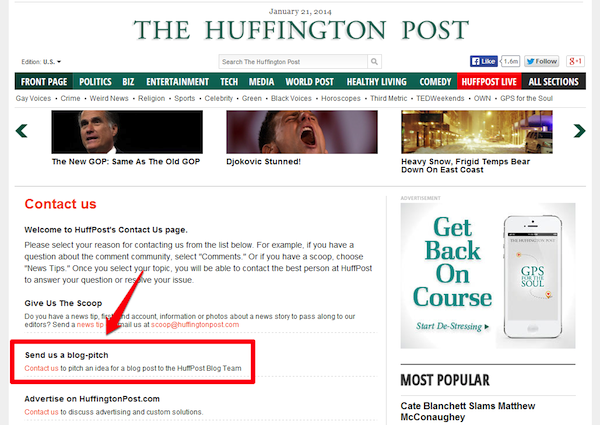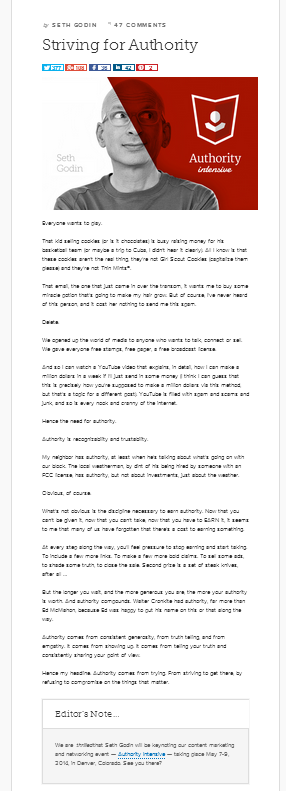I’m a professional link builder – I’ve literally built a business around building links.
Needless to say, I take it pretty seriously when Google’s head of webspam vents some frustration on the internet which leads to further link building fear, uncertainty and doubt.
I’m, of course, referring to what Matt Cutts wrote on January 20:
Okay, I’m calling it: if you’re using guest blogging as a way to gain links in 2014, you should probably stop. Why? Because over time it’s become a more and more spammy practice, and if you’re doing a lot of guest blogging then you’re hanging out with really bad company.
People in our industry tend to sensationalize the (often ambiguous) statements Cutts makes.
However, I wanted to address Cutts’ post, and explain why guest blogging isn’t going away in 2014. To summarize:
- Cutts never speaks in absolutes, and always leaves wiggle room.
- Google isn’t going to ignore good content just because it’s from a guest contributor.
- Much of Cutts rant was against low quality guest posting which is designed to create mass links instead of quality links (or other benefits of which guest blogging is capable).
- There is a wide world of difference between a low quality guest post such as Cutts describes and high quality guest posts – even if those high quality posts have links.
- Nofollowing all links within a guest post is infeasible and silly, and throwing the baby out with the bathwater.
- Guest blogging goes beyond SEO and Google, and has many additional benefits. Google couldn’t wholly kill guest blogging even if they really wanted to.
Cutts “Probably” Said Something
In his blog post, Cutts states that if you are guest blogging as a way to gain links, you should “probably stop”.
That’s right, he said “probably stop”. Remember the wiggle room I mentioned? There’s always a kernel of uncertainty and doubt. I don’t blame Cutts, and I certainly don’t envy him his job. But don’t take what he has to say as gospel.
Preserving Quality Content
It wouldn’t make much sense for Google to penalize high-quality content just because it was written by a guest author.
Google is a business. As a business, Google aims to provide their customers (users) with the best possible product (search results) they can. In fact, their entire business depends upon it.
Google made 96 percent of its revenue in 2012 from advertising within their search engine result pages. According to the Forbes 500 list, Google brought in $52.2 billion that year. Google has a whopping 67.3 percent of the search market cornered as of December 2013; as a company they rely on this monopoly – they can’t afford to have their search results dip in quality.
Why then would Google want to penalize an author and/or site that publishes useful content via guest blogging?
Punishing a high-quality site that accepts guest posts would only diminish the quality of Google’s own search results. Furthermore, many authoritative sites currently publish articles from guest bloggers.

While The Huffington Post may be an extreme example, there are also smaller quality sites that are utilize guest bloggers. The secret? An editorial process.
In fact, Cutts addresses this:
I’m also not talking about multi-author blogs. High-quality multi-author blogs like Boing Boing have been around since the beginning of the web, and they can be compelling, wonderful, and useful.
Clearly Google doesn’t want to cut these “high-quality multi-author blogs” from their search results, even if guest blogs are involved.
Content Distribution
It’s foolish to think that Google can cut off the democratic distribution of content, even in part.
Content marketers are eager to point out that John Deere was content marketing back in 1895. Direct mail advertisers have been active using the US Postal Service since the early 1900s. High-quality guest blogging is just the latest incarnation in a long history of content distribution.
A searcher doesn’t care who contributed a certain piece of content, they only care that the author is a credible authority and the content is useful.
If Google penalized or devalued sites that accept guest blogs it could have a detrimental impact to their search quality, and ultimately their revenue. It would certainly have a detrimental impact on many authoritative, well respected sites.
It would be fairly presumptuous for Google to think they can disrupt the distribution of content on the internet.
No, Cutts was referencing low-quality guest blogging: poorly-written blog posts which are not relevant, with poor content, often sent via mass-emailing a multitude of blog owners hoping something sticks.
Cutts even changed the title of his post to reflect this, from “The decay and fall of guest blogging” to “The decay and fall of guest blogging for SEO”. I believe this really means “The decay and fall of low-quality guest blogging”.
Low-Quality Guest Blogging
There’s actually a large gap between credible guest blogging and guest blogs written as quickly as possible for a link.
Low-quality guest blogs contain spun content (re-written quickly and unintelligibly), awkward keyword-rich anchor text, and an abundance of grammatical and spelling errors. Often they read like a rough draft, and contain general or vague information as opposed to specific, nuanced knowledge.
An example of what Cutts was talking about:

The title alone sounds more suited for an experimental poem than a useful article. It’s awkward, and clearly not written with the reader in mind.
Looking at the header, we notice a few additional signs of low-quality guest blogging:

First, this post received zero comments. None. No one was compelled by this piece. Zero engagement.
We can also see that the article has been attributed to “John Lennon.” However, the bio reads:

The byline doesn’t match the bio, which makes verifying authorship quite difficult. And Christina No-Last-Name is clearly not a grammar expert.
The clarity of the rest of the article is just as questionable as the headline and bio. Let’s take a look at the first paragraph:

Judging from the first sentence alone, I would wager that this piece of content has been spun by either a robot or a non-native English speaker. It has no sense of the conventions of the English language, let alone a nuanced understanding of how to use language to encourage a connection with the topic.
This is the kind of guest blog spam Cutts was actually referring to – unfortunately he provided no solid examples, which can cause fear, uncertainty, and doubt.
High-Quality Guest Blogging
High-quality guest blogs are well-written with evidence of social shares and verifiable authorship. They form a connection between the reader and the topic at hand. All while providing content that is, you know, actually valuable.
Here is an example of such a post:

Seth Godin is a respected blogger and marketer with a strong social presence. The above article has (as of this writing) been tweeted more than 500 times. His writing is clear, concise, and provides an intelligent message to his readers.
The article also contains a bio link (pictured below). As you can see, it leads the user to the most natural/logical place imaginable: Godin’s own blog.

The link to Mr. Godin’s blog is natural to allow a reader to explore more of his work.
The green highlight is courtesy of the Mozbar, which means the link is a dofollow link.
Links within Guest Blogs
Back in July, John Mueller of Google suggested making any links that you include in a guest blog “nofollow”. With Cutts’ post, it now appears Google may be looking at guest blog links more closely.
Again, I would state this is a quality over quantity issue. Credible guest blogs will always have the need to link out to other sites, editorially.
This is literally the link web Google was founded on; editorially placed links used to cite information, explain a concept, or recommend a product/site.
Sure, there will be guest posts that only exist for a single link which is clearly pointing to a client. But for quality guest blogs there will always be an editorial link or two – links that were just nofollowed because they ‘might’ be someone’s attempt at building a link.
This is throwing out the baby with the bathwater – were this to become common practice, Google would be polluting their own link web since many editorial links would suddenly become nofollowed, dubbed questionable.
Guest blogging exists outside of link building, and even Google; it serves legitimate branding and authority building functions beyond SEO – which is why Cutts was forced to change the title on his blog post.
It’s important to understand the need for diverse strategies in link building; it’s always a bad idea to bet it all on black. But I for one don’t believe that guest posting even for SEO is dead. I don’t believe Google has the power to kill guest posting, if they even wanted to.
Quality has been a persistent issue in link building. No one would argue that spammers haven’t been abusing guest blogging. But I still believe guest blogging can be done with integrity, and quality.
Don’t Stick a Fork in it Yet…
Since his proclamation to “stick a fork in guest blogging”, Cutts has backed away from his blanket statement. To drill down and takeaway something from his post, we must look at the last paragraph of the section he added after he initially published it.
“I just want to highlight that a bunch of low-quality or spam sites have latched on to “guest blogging” as their link-building strategy, and we see a lot more spammy attempts to do guest blogging. Because of that, I’d recommend skepticism (or at least caution) when someone reaches out and offers you a guest blog article.”
I feel pretty comfortable saying Cutts intent in this post was likely to discourage spammy guest bloggers and warn inexperienced webmasters. A warning shot against spammy practices.
This could actually lead (hopefully) to improvements in the guest blogging realm as bloggers and webmasters alike will likely raise their quality standards.
Looking at the past and the types of link schemes/tactics that Google has “killed”, we can draw a common theme. Tactics like article marketing and comment spam were easily identifiable and traceable tactics that existed primarily to grant a quick and easy link.
Guest blogging is different. High-quality guest posting serves a legitimate function online, beyond even quality link building. Google literally can’t kill guest posting because it resides outside the realm of link building and Google itself.
Maybe Cutts should have changed the title of the post to “The decay and fall of spammy guest blogging”.






